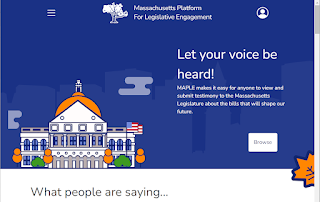State Representative Jeffrey N. Roy (D-Franklin) proudly honored Richard "Dick" Hynes of Franklin today at the first-ever Military Appreciation Day ceremony held in the Massachusetts State House's historic House Chamber.
Military Appreciation Day was created by the Healey-Driscoll Administration to establish a lasting annual tradition that brings together local, state, and community leaders to honor those whose service might otherwise go unrecognized. Each legislator was invited to nominate a member of their local military community-whether a veteran, active-duty service member, National Guard, Reservist, or military spouse-to be honored during the ceremony. More than 125 individuals who exemplify commitment to service and community were recognized from districts across Massachusetts.
"I'm proud to recognize Richard "Dick" Hynes for his military service and community leadership," said Representative Jeffrey N. Roy (D-Franklin). "His contributions reflect the strength, resilience, and dedication of our local military community, and I'm honored to celebrate him at this statewide event. We appreciate his service and efforts to keep the memories of our 45 fallen soldiers alive with moving ceremonies at the Veterans Memorial on the Franklin Town Common."
 |
| (L-R) Dick Hynes, St Rep Jeff Roy |
Hynes served in the Navy as a Medic during the Vietnam War from August 1962 to April 1967. Dick attained the rank of HM2 which is the Hospital Corpsman Second Class and is the largest occupational rating in the Navy. Dick proudly received the National Defense Medal along with the Good Conduct Medal. While serving, he met Judy, his Navy nurse wife of 43 years.
For the past several years, Hynes has led efforts to honor the 45 Franklin veterans who lost their lives in service to our country. The Town of Franklin has one of the most beautiful Veteran's Memorial areas in the state, including 45 granite posts which line the Veterans' Walkway. Each one of these posts is dedicated to a Franklin veteran who gave his life, defending our freedom.
Under Dick's leadership, along with Franklin's Veterans' organizations, the Edward L. Grant American Legion Post 75, and the Veterans of Foreign Wars Post 3402, a program has been developed honor and remember those who died for our nation. This program includes the placing of a Memorial Wreath for the day, the playing of Taps, a salute from those present, and a reading of whatever history we may have on that veteran.
The State House ceremony featured remarks from Governor Maura Healey, Lieutenant Governor Kim Driscoll, Veterans Services Secretary Jon Santiago, Senate President Karen Spilka, and a keynote address by General Joseph F. Dunford, Jr. (Ret.), former Chairman of the Joint Chiefs of Staff and 36th Commandant of the U.S. Marine Corps.
"This event is about gratitude," said Governor Maura Healey. "We're here to honor the everyday heroes-veterans, active-duty service members, and military families-whose courage, strength, and commitment continue to shape our state for the better. Military Appreciation Day is now a Massachusetts tradition and one we'll proudly carry forward each year."
"Massachusetts is home to one of the most vibrant, committed military communities in the country," said Lieutenant Governor Kim Driscoll. "This day is about uplifting the stories and contributions of those who have sacrificed so much and showing that their service will never go unrecognized."
"Every day, I meet veterans and military families who continue to lead, serve, and inspire," said Secretary Jon Santiago. "As we approach Memorial Day, and during a month dedicated to honoring our military, this event reflects what makes Massachusetts special: a deep respect for service, and a commitment to those who wear the uniform-and those who stand beside them."
"My father's service in the United States Army defined his life and deeply shaped my own - and I know the same holds true for thousands of service members and their families across Massachusetts," said Senate President Karen E. Spilka (D-Ashland). "It is a privilege to honor those residents who have dedicated themselves to serving our country, and I am profoundly grateful for their unwavering commitment and sacrifice."
"It is an honor to host the inaugural Military Appreciation Day in the historic House Chamber," said Speaker of the House Ronald Mariano. "This new tradition reflects our deep appreciation for the veterans, service members, and military families who strengthen every corner of our Commonwealth."
The keynote address was delivered by General Joseph F. Dunford, Jr. (Ret.), former Chairman of the Joint Chiefs of Staff and 36th Commandant of the U.S. Marine Corps. A Boston native and one of the most distinguished military leaders in recent history, General Dunford spoke about the legacy of service, leadership, and community and the importance of honoring those who serve across generations.
"It's an honor to return home to Massachusetts and stand alongside a community so deeply committed to those who serve. Military Appreciation Day reflects something I've long believed: that service is not just what we do in uniform-it's a lifetime of leadership, character, and sacrifice," said General Joseph F. Dunford, Jr. (Ret.), 19th Chairman of the Joint Chiefs of Staff. I'm proud to join the Commonwealth in recognizing these remarkable individuals and the values they represent."
The program also featured a powerful performance of the National Anthem by Springfield native and NBC's The Voice finalist Michelle Brooks-Thompson. Following the ceremony, honorees and guests were invited to a lunch reception generously donated by the Military Friends Foundation, a Massachusetts nonprofit dedicated to providing support and emergency assistance to military families and families of the fallen.
To view the full list of 2025 Military Appreciation Day honorees ->













